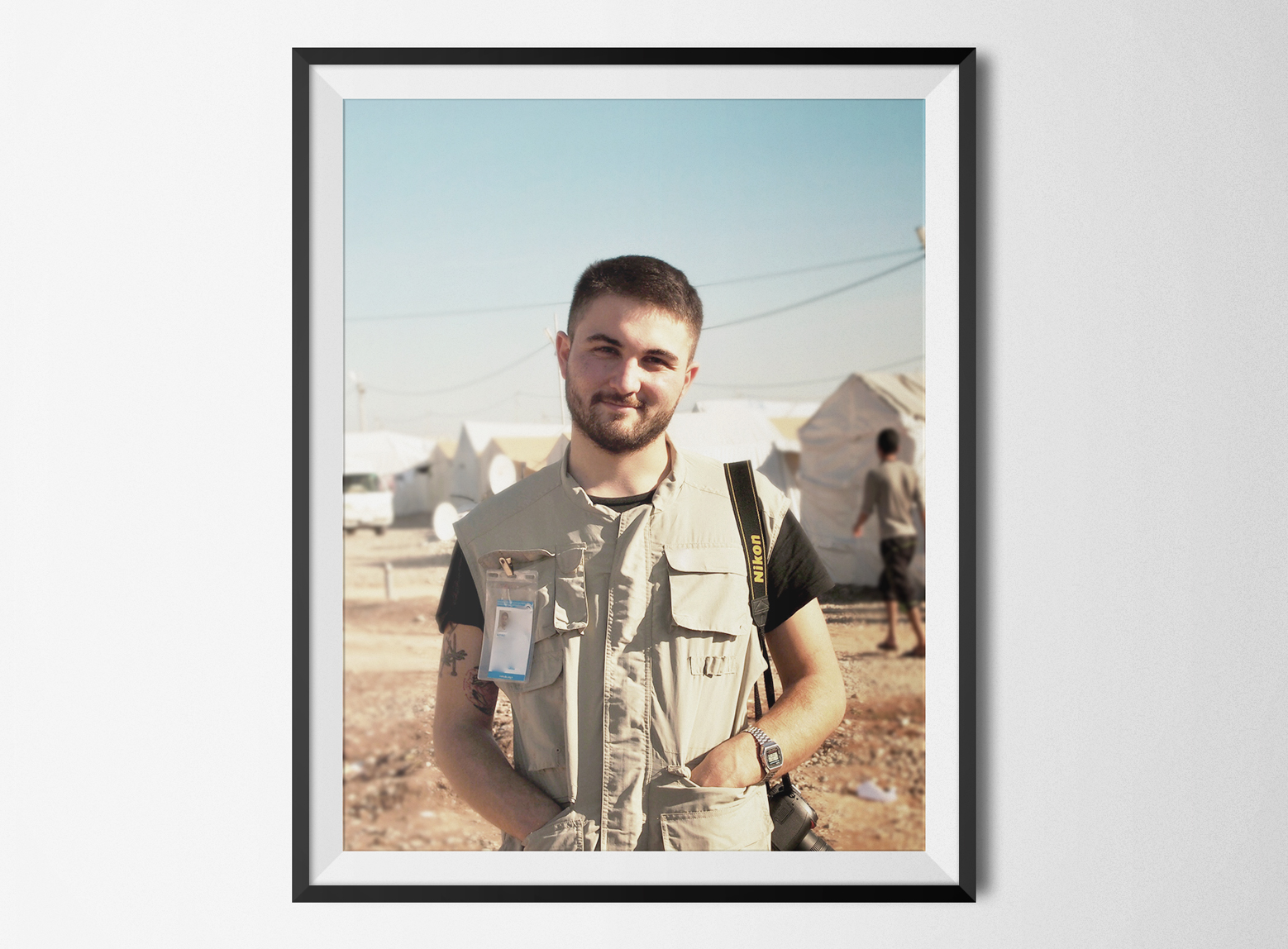In conversation with M&E Specialist Muhip Ege Caglidil
May 17, 2019
Monitoring and Evaluation Specialist Muhip Ege Caglidil talks about his experience of working in M&E. He shares the inspiration behind his career choice, some good tips and resources to advance in the sector, and reveals the current challenges, opportunities and the utmost need for digitalisation in M&E.
A quick introduction
Which organisation do you work for?
Currently, I am an independent consultant, but in the past, I had a chance of working with various international organisations, namely Save the Children, Shelter Centre, UNHCR and a number of research institutions.
Which region(s) of the world have you worked in so far?
Primarily in the MENA region, including Turkey, Kurdistan Region of Iraq (KRI), Iraq and Jordan.
What is your favourite dish? (optional)
Without any hesitation, it is Fir-Fir with Injera (sautéed injera) – a breakfast dish from Ethiopia.
What are your favourite leisure activities? (other than M&E, of course!)
Running half marathons, swimming, and race biking

M&E Specialist Muhip Ege Caglidil hopes to promote digitalisation in M&E systems to make aid more effective and accountable for everyone.
Let’s talk about your career in M&E
How long have you worked in the M&E sector?
My experience in the Humanitarian/development sector is over four years, and three years progressively in M&E roles. My M&E experience combines both academic and hands on experience in the field.
What inspired you to pursue a career in M&E?
Primarily, my personal experience of working in different contexts led me to choose the path of M&E. Most notably in 2015, when I was working in the autonomous KRI for a middle-sized organisation as a Program Officer. We had no M&E framework in place, thus we were unable to understand the basic field necessities and the progressive scale of our impact.
The same year, the scale of the needs of aid dependent populations in KRI and Iraq sky-rocketed, with the rise of massive displacements across Syria and Iraq. It was a time where humanitarian actors needed to respond to mass displacements with smaller funds in a shorter period of time. However, only a few organisations were able to reflect the emerging needs of affected populations with successive operations across the country. In my view, what made these particular organisations successful was their very well integrated M&E departments, which enabled them to monitor needs and impact progressively, and take vital decisions based on progressive evidence.
In 2015, some organisations with poorly integrated M&E systems were not only failing to respond effectively but they also had weaker leverage on the table to convince donors for larger funds. This was primarily because they lacked evidence to put on the negotiation table. In 2015, KRI and Iraq were hosting millions of IDPs, yet if you visit ReliefWeb and check out the number of field assessments, you will be surprised to see the insufficient number of studies and organisations in response to such a large scale of displacement.
In short, while the emerging needs of aid dependent people are increasing, available funds for aid-dependent populations are relatively declining. To cope with such a dilemma, we need to make aid more effective and accountable, and in my view, the only way to do so is by building better integrated M&E systems and exploiting new technologies in the age of digitalisation. This is another reason why I have chosen the M&E path – to promote digitalisation in M&E systems in order to make aid more effective and accountable for everyone.
Your most joyful or memorable moment related to your M&E work?
In 2017, I was part of the ‘Education in Emergencies Program’ at Save the Children. With a global network of different professionals, partners and M&E experts, the program was aiming to understand the specific needs of children in conflict regions and to suggest new methodologies and tools to monitor their needs in war regions. Although I was involved in the program within the Syria response team for only a few months, being able to brainstorm and learn about the vital question of how to make M&E more child friendly was something invaluable for me and my career.
Your most frustrating or challenging moment related to your M&E work? (optional)
I have never met any M&E professional without frustrating moments in their career. 🙂
M&E in your perspective
What do you think are the biggest opportunities in M&E today?
During my deployment at Save the Children, we had one striking motto that was summarizing why well-integrated M&E systems may give us the key to open doors to effective aid and accountable project cycle management.
“We treasure, what we measure.” Today M&E gives us the right tools and framework to read the project cycle from both the insider and outsider perspective. In other words, M&E allows us to measure what we treasure in any project cycle.
In the last decade, the international private sector in general has experienced massive structural change by opening its doors to Data Science and other innovative developments in the fruitful field of big data, varying from Blockchain technology to Machine Learning. I believe, there are many more opportunities to discover in the age of digitalisation. The faster we adopt and optimise fruits of digitalisation into our operations, the healthier and better aid we can provide as humanitarian/development professionals.
What do you think are the biggest challenges in M&E today?
I believe technology has the power to improve the way organisations operate and run their projects. Unfortunately, the humanitarian/development sector is much slower than the private sector to follow new and emerging technological trends. Although at leadership level many organisations show strong commitments to exploit upcoming opportunities in Big Data or data analytics, in my experience only a few adopt them in the field.
Often, the barriers against adopting new opportunities are defined as lack of capacity or funding within the humanitarian sector. Yes, the lack of capacity or funding has always been a major challenge for almost all humanitarian and development professionals around the world, but when it comes to adopting new technologies, the problem often lies with an organisation’s institutional resistance to change. To overcome such resistance, M&E professionals need to take more rigorous initiatives and show how and why new technologies can be helpful for the overall project cycle and operations.
In your opinion, what are some good skills to have to work in M&E?
In my view, there are two core skills that would give M&E professionals a big plus:
1) Having knowledge or training in behavioral social science
2) Having experience/knowledge in digital products that support the data life cycle such as Power BI, SQL, Machine Learning, ODK based software and programming languages such as R and Python.
Digital M&E
What comes to your mind when you hear about “The Digitisation of M&E”?
The first thing that comes to my mind is the question whether digitalisation of M&E will liberate M&E professionals from the reign of Excel driven data and information management. As an M&E professional committed to better evaluation for better aid, I see many opportunities arising over the course of ‘digitalisation of M&E’, and it makes me sad to see that many organisations and donors are still running their programs in Excel. Although MS Excel has found widespread application across projects, it’s not the best choice in my view. This is simply because with MS Excel, you will have the opportunity to view the raw data all at once. That makes it impossible to differentiate between crucial data sets and the unimportant ones.
Furthermore, when it comes to performing successful data analysis, spreadsheets take a backseat. With huge data volumes being represented in these spreadsheets, M&E professionals might find it difficult to analyze it. Based on my personal experience, spreadsheets create ample opportunities for accidental data loss, which makes it impossible to share crucial data and information within the organisation. Most importantly, the data sets can’t be shared in real-time, which is a severe disadvantage.
In short, there’s no denying the fact that we are living in an age, where Big Data analytics seems to be the key to achieving unsurpassed success. ODK based software programming languages or simple solutions like TolaData might be so much more efficient and effective to carry out data analysis and make evidence-based decisions.
Tips and recommendations
Do you have any advice for people who are thinking about starting a career in M&E?
I would definitely recommend learning core data analytics skills. Even If you are planning to pursue a career as a qualitativist, learning data analytics is always a big plus in M&E.
Are there books or any resource materials on M&E that you would like to recommend? (optional)
For those academically interested in M&E, I would definitely suggest the following articles written by M&E academics:
- Planning Evaluation Through the Program Life Cycle – Mary Ann Scheirer
- Qualitative Comparative Analysis as an Evaluation Tool: Lessons From an Application in Development Cooperation – Valérie Pattyn, Astrid Molenveld, Barbara Befani
- Suggested Guidelines for Writing Reflective Case Narratives: Structure and Indicators – Karin L. Becker, Ralph Renger
- The Chi-Square Test: Often Used and More Often Misinterpreted – Todd Michael Franke, Timothy Ho, Christina A. Christie
Final words
What is the funniest reaction you’ve encountered when you told someone (maybe from outside the non-profit sector) that you were “working in M&E”? (optional)
Back at Save the Children, my official title was Monitoring, Evaluation Accountability and Learning Officer, in short MEAL Officer. For people unfamiliar with this term, I received many jokes whether I have now shifted my career to being a Cook!
Contact:
Muhip Ege Caglidil
LinkedIn – Muhip Ege Caglidil
Twitter – @EgeMuhip
We hope you enjoyed exploring M&E from a specialist’s perspective. Do let us know if you have any questions that you would like us to ask our next M&E expert in the upcoming interview.

